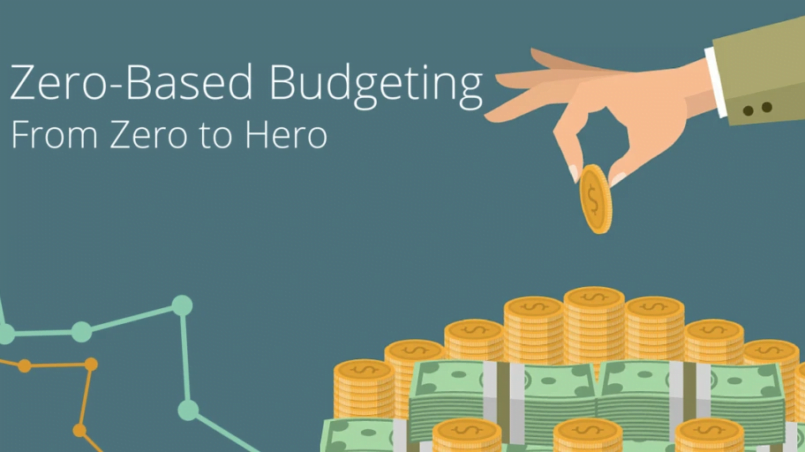
Introduction:
In this Article lets see in detail What is Zero-Based Budgeting, Its meaning, Step by step procedure, Advantages & Disadvantages
What is Zero-Based Budgeting
Zero-based budgeting (ZBB) is an approach to making a budget from scratch. The budget is not based on previous budgets. Instead, the budget starts at zero. It involves re-evaluating every line item of cash flow statement and justifying all the expenditure that is to be incurred by the department.

Must Read: WHAT ARE CASH FLOW STATEMENT
Zero-Based Budgeting meaning
- Zero-based budgeting (ZBB) is a method of budgeting in which all expenses must be justified for each new period. The process of zero-based budgeting starts from a “zero base,” and every function within an organization is analyzed for its needs and costs. The budgets are then built around what is needed for the upcoming period, regardless of whether each budget is higher or lower than the previous one.
- Thus, zero-based budgeting definition goes as a method of budgeting whereby all the expenses for the new period are calculated on the basis of actual expenses that are to be incurred and not on the differential basis which involves just changing the expenses incurred taking into account change in operational activity. Under this method, every activity needs to be justified, explaining the revenue that every cost will generate for the company.

Zero Based Budgeting Steps
- Step 1: Identifying the decision units that need a justification for every line item of expenditure in the proposed budget.
- Step 2: Preparing Decision Packages. Each decision package is an identifiable and separate activity. These decision packages are connected with the objectives of the company.
- Step 3: The next step in ZBB is to rank the decision packages. This ranking is done on the basis of cost-benefit analysis.
- Step 4: Finally, funds are allocated on the basis of the above findings by following a pyramid ranking system to ensure maximum results.
Zero-Based Budgeting vs. Traditional Budgeting
- In traditional Budgeting, the previous year’s budget is taken as a base for the preparation of a budget. Whereas, each time the budget under zero-based budgeting is created, the activities are re-evaluated and thus started from scratch.
- The emphasis of the traditional budgeting is on the previous expenditure level. On the contrary, zero-based budgeting focuses on forming a new economic proposal, whenever the budget is set.
- Traditional Budgeting works on cost accounting principle, thereby, it is more accounting oriented. Whereas the ZBB is decision oriented.
- In the traditional budgeting, justification of the line items and expenses are not at all required. On the other hand, in zero-based budgeting, proper justification is required, taking into account the cost and benefit.
- In traditional budgeting, the top management takes decisions regarding any amount that will be spent on a particular product. In contrast, in zero-based budgeting, the decision regarding the spending a specific sum on a particular product is on the managers.
Example of Zero-Based Budgeting
- The concept of ZBB has been in use in Indian private industry since long. For example, Britannia Industries Ltd. and Union Carbide have been using it since 1977-78 without calling it Zero base budgeting. However, in government context, it is of recent origin. The first application of the system was in the Department of Science and Technology in 1983
- Among the State governments, Maharashtra has been implementing ZBB in 42 departments. The budget for 1987-88 reflected a saving of Rs. 50 crores. Several, redundant and duplicative and low priority schemes have either been eliminated or merged.
- Similarly, Karnataka Government experimented with ZBB in Public Health and Agriculture Sections and also had plans to apply it to all 45 departments. Among the public sector undertakings, Madras Refineries Ltd., HMT, BHEL, BEL, Indian Telephone Industries, Indian Oil, Neyveli Lignite Corp., a few steel plants and also nationalized banks have planned to implement ZBB.
Advantages of Zero-Based Budgeting
- Efficiency: ZBB helps a business in the allocation of resources efficiently (department-wise) as it does not look at the previous budget numbers, instead looks at the actual numbers
- Accuracy: Against the traditional budgeting method that involves mere some arbitrary changes to the earlier budget, this budgeting approach makes all departments relook every item of the cash flow and compute their operation costs. This methodology helps in cost reduction to a certain extent as it gives a true picture of costs against the desired performance.
- Budget inflation: As mentioned above every expense is to be justified. ZBB compensates the weakness of incremental budgeting of budget inflation.
Disadvantages of Zero-Based Budgeting
- High Manpower Turnover: The foundation of zero-based budgeting itself is a zero. Budget under this concept is planned and prepared from the scratch and also require the involvement of a large number of employees. Many departments may not have adequate human resource and also time for the same.
- Time-Consuming: This ZBB approach is a highly time-intensive for a company to do annually as against incremental budgeting approach, which is a far easier method.
- Lack of Expertise: Providing an explanation for every line item and every cost is a problematic task and also requires training for the managers
ZBB targets at presenting true expenses to be incurred by a department. Although this budgeting method is time-consuming, this is a more appropriate way of budgeting. This includes all-inclusive analysis of the budget proposal and if the managers make irrelevant variations so as to achieve what they want, they are probably exposed.

LIKE WHAT YOU’RE READING?
CHECK OUT SOME OF OUR OTHER GREAT CONTENT HERE:
- WHAT ARE CASH FLOW STATEMENT
- CHARACTERISTICS OF THE MIXED ECONOMY
- UNDERSTANDING DIGITAL MARKETING
- IMPACT OF MARKETING ON SOCIETY
- PERFORMANCE MARKETING – A BEGINNER’S GUIDE
- EFFECTIVE BRANDING METHODS
- UNDERSTANDING CONSUMER BEHAVIOR
- HOW TO INCREASE SALES?
- HOW AI IS USED IN DIGITAL MARKETING?
- 5 BEST SOCIAL MEDIA PLATFORMS FOR BUSINESS IN 2022
- WHAT IS AFFILIATE MARKETING? (HOW TO GET STARTED)
- SWOT ANALYSIS WITH EXAMPLE
- WHAT IS THE DEFINITION OF ECOMMERCE
- 5 BEST MARKETING STRATEGY IN PRODUCT LIFE CYCLE FOR 2023
- 8 STRATEGIES OF RETAIL MARKETING TO DRIVE SALES
- WHAT IS THE IMPORTANCE OF MARKETING IN A BUSINESS?
- DEFINITION OF B2C MARKETING WITH EXAMPLE




what’s up, highly regarded blog on lardaceous loss. such a person helped.